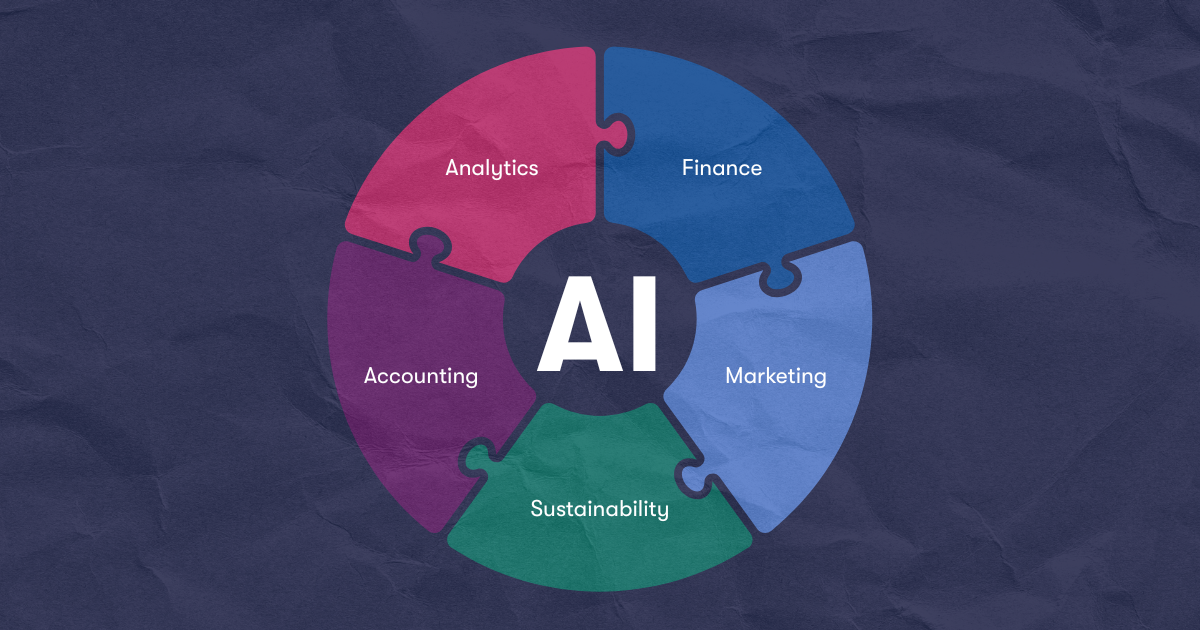.png)
Kogod School of Business
Head to the internet and you’ll find endless statistics, theories, and conclusions on the impact artificial intelligence will ultimately have on businesses—and on society more broadly.
In fact, a lot of it is happening already. The emergence of generative AI is already helping companies streamline their workflows and problem-solve. AI tools are assisting analysts in interpreting data to answer critical business questions. And, they’re helping managers in tactical decision-making.
Along the way, this emerging technology also presents a wide range of opportunities (and implications) for the workforce, particularly as these tools become increasingly integrated into our day-to-day lives, both at home and at work.
A column in the Wall Street Journal noted that even companies that were slower to adopt earlier innovations, such as the smartphone and social media, have already gotten on board with AI tools.
That dovetails with a report by the Federal Reserve Bank of St. Louis, which concluded that AI’s adoption has occurred at a more rapid pace than that of the internet or personal computers—a sign of how widespread the use of tools like ChatGPT has already become across demographics.
In the realm of business, part of what makes the rise of AI so significant is its vast impact across numerous industries, with a myriad of applications, whether you work in finance, healthcare, transportation, or hospitality (among many other sectors).
And AI tools are poised to transform many more industries in the next few years.
We asked some top experts from a cross-section of major business industries to share their perspectives on how they envision the growth of AI impacting their field.
Finance
In the financial sector, AI figures to play a major role in upending how companies analyze data and, in turn, make decisions, said Tim Timura, professor of finance and real estate at American University’s Kogod School of Business.
“AI is revolutionizing finance by providing faster and more accurate platforms for the analysis of larger and higher quality data sets,” Timura said. “This enhanced analytical capability in turn allows for better risk assessment and independent-minded decision-making in pursuit of higher risk-adjusted returns on capital.”
A 2024 survey by KPMG, focusing on the finance sector, found that 88 percent of companies were using AI in some capacity, and that for 92 percent of the firms surveyed, the technology had met or exceeded their return on investment expectations.
Marketing
AI is already leading to vast changes in the marketing sphere, offering new opportunities to companies that may have had more limited budgets to produce content and brand assets.
“Generative AI is making content creation more scalable, consistent, and approachable for many businesses,” offered Kelli Frias, professor of marketing at Kogod.
“For small businesses and startups with limited marketing resources, generative AI can be particularly helpful in developing a brand, creating promotional campaigns, and improving lead generation. It may even create customer profiles that provide companies with a deeper understanding of their target markets.”
Still, any manager overseeing the deployment of AI into their marketing strategy should offer their team guardrails in integrating these tools, Frias cautioned.
It’s a reminder of the steadfast importance of human workers at a time when concerns about AI’s arrival have simultaneously ushered in uncertainty about its impact on the global workforce, as spelled out in an Axios story about a so-called “white-collar bloodbath.”
We should remember our role in utilizing these tools. We should act as the managers, not the assistants.”

Kelli Frias
Professor of Marketing, Kogod School of Business
Accounting
Questions about efficiency and workforce are similarly front and center in the accounting sector, where AI tools have already demonstrated strong potential in reducing the time it takes to complete tedious tasks and digest large amounts of information within a relatively short timeframe.
“Generate, reduce, compare, and transform” is the pattern when it comes to AI’s role in accounting, said Kogod professor in accounting Yinqui Zhang, citing the mantra often repeated by a colleague.
“While accountants and auditors aren’t going away, the technology is raising the bar for the accounting profession,” Zhang explained. “Generative AI can generate responses to complex questions about accounting and tax regulations, reduce the time required to review lengthy contracts and agreements, compare filings to highlight key differences, and transform data into more structured formats for analysis.”
Sustainability
The rapid growth of AI has raised numerous concerns about its environmental impact, particularly regarding energy and resource usage.
However, experts also see opportunities for these tools to help companies develop sharper, more targeted strategies around sustainability, while identifying more targeted ways to reduce energy usage and waste.
“While AI data centers will drive unprecedented energy consumption, these same technologies enable businesses to optimize resource usage with precision,” said Garima Sharma, professor of management focused on sustainability at Kogod.
“For sustainability advocates, the critical questions are not whether AI will help or hurt,” Sharma added. “But, when these impacts manifest, which sectors will be affected, and who will bear the consequences or reap the benefits?"
IT & Analytics
Information technology and analytics are two arenas on the front lines of AI development and deployment, and workers in these fields will continue to see the technology transform their roles for years to come.
Shawn Janzen, Kogod professor of information technology and analytics, views AI tools as complementary to the analytical work companies have relied on for years.
“Aspects of AI, including machine learning, have long been part of analytics, although recent advances in generative AI are fundamentally reshaping how businesses and data professionals approach decision-making,” Janzen said.
Contrary to the idea that AI will fully replace human analysts, AI-augmented analysts bring critical thinking, domain expertise, and an understanding of business and human dynamics that AI technologies alone lack."

Shawn Janzen
Professor of Information Technology and Analytics, Kogod School of Business
“Analysts remain essential for navigating ongoing challenges around data ethics, data ambiguity, and the responsible use of information, making them a vital human element in any organization adopting AI," Janzen added.
How Kogod is preparing students for a business world transformed by AI
Kogod is preparing students for a business landscape that looks significantly different from what it did even a few years ago—one that’s seeing AI transform nearly every major industry.
Across 40-plus business classes, Kogod offers a curriculum infused with AI that has been called “the most consequential AI transformation in business education.”
The core approach: complementing deep business and interpersonal skills with the skills students need to maximize these emerging technologies, from the aspiring executive of a major corporation to the head of a non-profit organization or an entrepreneur plotting their next startup.
